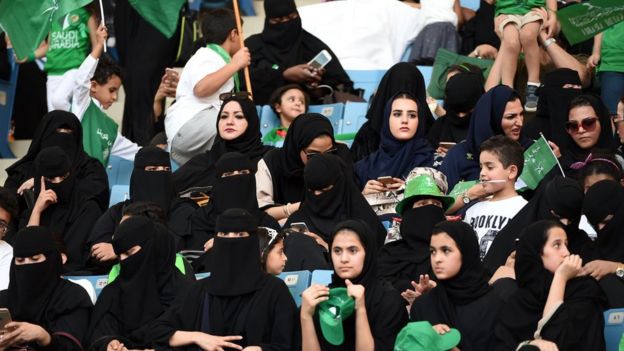Campaigners in Saudi Arabia have hailed King Salman’s decree allowing women to drive for the first time.
One female activist called it a “great victory”, while another said things would “never be the same again”.
The country’s US ambassador has described the move as “the right decision at the right time”.
The Gulf kingdom is the only country in the world that bans women from driving – and women are still subject to strict dress codes and gender segregation.
Until now, only men were allowed licences and women who drove in public risked being arrested and fined.
Campaigner Sahar Nassif told the BBC: “I couldn’t believe it. I started laughing and jumping and screaming. It’s a great victory.
“I’m going to buy my dream car, a convertible Mustang, and it’s going to be black and yellow!”
Meanwhile, Latifah Alshaalan, a member of the Shura council, a government advisory panel, told broadcaster Al Arabiya: “This is a great victory for many Saudi women. This was the one file and issue which Saudi women have fought not just years, but decades for.”
What happens now?
- A ministerial body will be set up to give advice within 30 days
- The royal order will be implemented by 24 June 2018
The country’s US ambassador, Prince Khaled bin Salman, confirmed that women would not have to get male permission to take driving lessons, and would be able to drive anywhere they liked.
What has the road to reform been like?
Rights groups in the kingdom have campaigned for years to allow women to drive, and some women have been imprisoned for defying the rule.
Female activists organised collective protests in 1990, 2011 and 2013, and posted online videos of themselves driving.
In recent years, some members of the Saudi royal family have expressed support for ending the ban.
Last year, the government launched the Vision 2030 plan to modernise the economy – which was seen as a sign the country was moving towards reform.
What was the reaction?
The move was welcomed by the US state department, which called it “a great step in the right direction”.
UN Secretary General Antonio Guterres echoed that sentiment.
Manal al-Sharif, an organiser of the Women2Drive campaign who has also been imprisoned for driving, said on Twitter that Saudi Arabia would “never be the same again”.
Not everyone reacted positively, however, with conservative voices accusing the government of “bending the verses of Sharia”.
The hashtags “I am my own guardian” and “Saudi Women Can Drive” quickly gained traction on social media – but so did the hashtag “the women of my house won’t drive”.
Analysis: A massive change for Saudi society
By Frank Gardner, BBC News
This decree is huge for Saudi Arabia. For decades now, Saudi women, many of whom are extremely well-educated and ambitious, have been waiting for their chance to participate fully in their country’s economy.
For all this time families have had to stretch their budgets to the limit, as they have had to hire in chauffeurs from south and south-east Asia, house them, feed them and insure them.
An estimated 800,000 chauffeurs currently ferry Saudi women around. The reason it has taken so long is the long-standing opposition from religious conservatives, who have expressed views varying from “they are too stupid to drive” to “it will lead to intolerable mingling of the sexes”.
Yet this decree is in line with a programme called Vision 2030, promoted by Saudi Crown Prince Mohammed Bin Salman, to modernise Saudi society and bring it more into line with the rest of the world.
Lifestyle limits remain for Saudi women
Saudi law enforces a strict form of Sunni Islam known as Wahhabism and is known for its gender segregation rules.
Women have to adhere to strict dress codes, must not associate with unrelated men, and if they want to travel, work or access healthcare they must be accompanied by – or receive written permission from – a male guardian.
The Islamic kingdom recently faced a backlash from conservatives on social media after allowing women to participate in Saturday’s National Day celebrations for the first time.
What is your reaction? Are you a woman who’d like to drive in Saudi Arabia? You can share your experience by emailing haveyoursay@bbc.co.uk.
Please include a contact number if you are willing to speak to a BBC journalist. You can also contact us in the following ways:
BBC
 Q FM Africa's Modern Radio
Q FM Africa's Modern Radio
